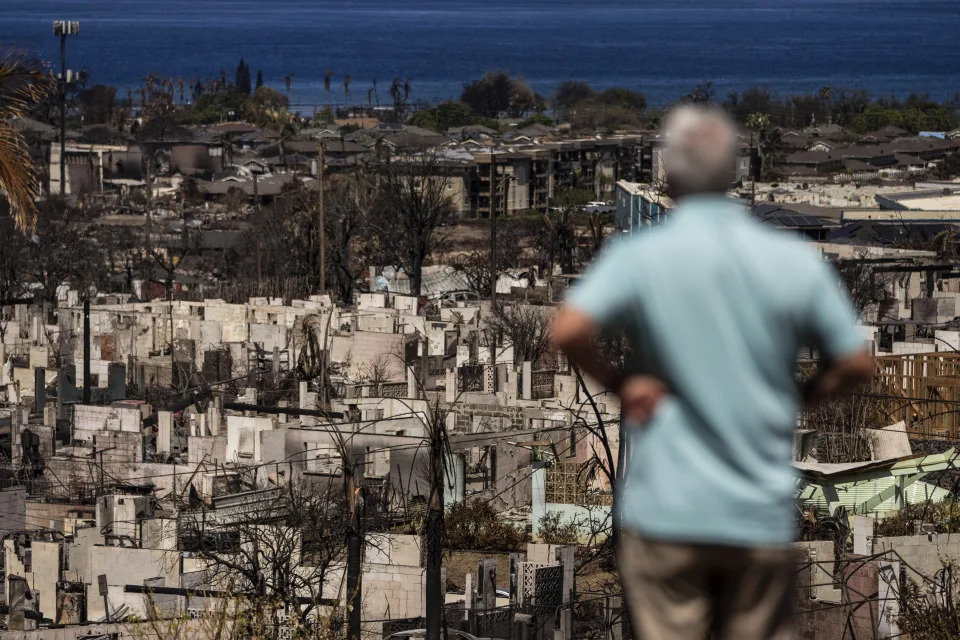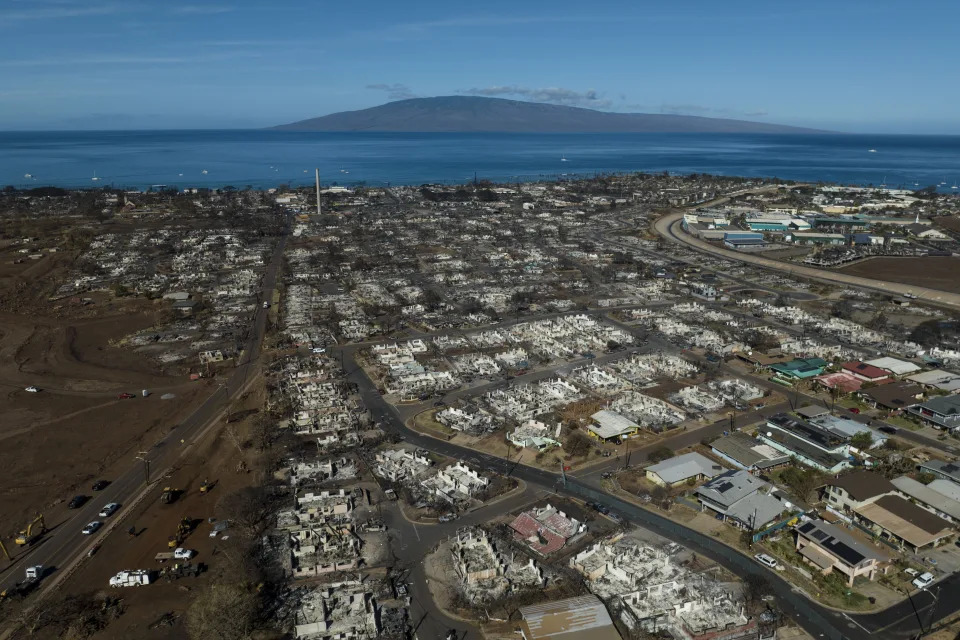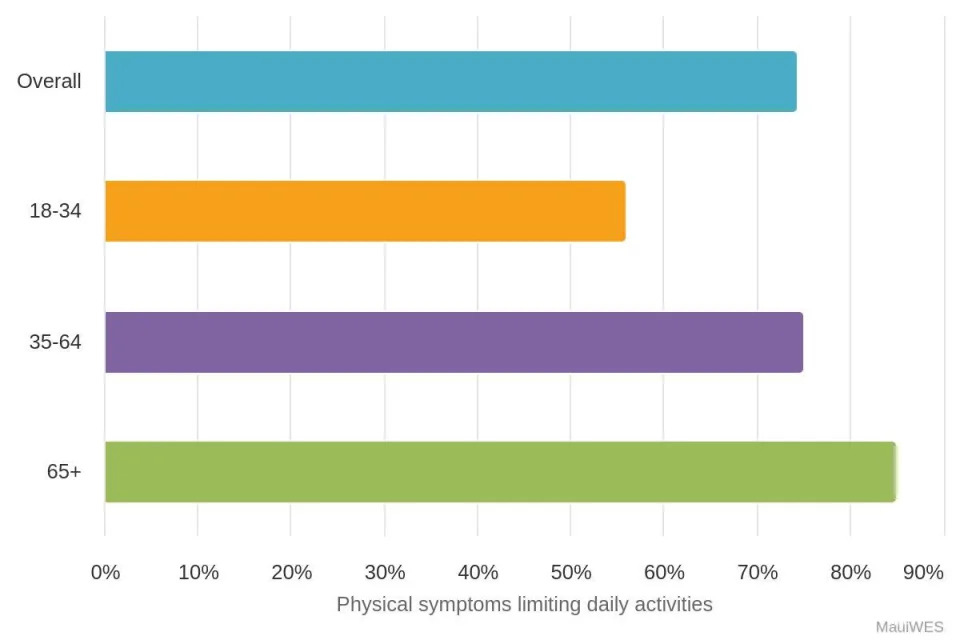AUDREY McAVOY
Updated Wed, May 15, 2024


A general view shows the aftermath of a wildfire in Lahaina, Hawaii, Thursday, Aug. 17, 2023. A University of Hawaii study examining the health effects of last year's deadly wildfires on Maui found that up to 74% of participants may have difficulty breathing and otherwise have poor respiratory health, and almost half showed signs of compromised lung function. (AP Photo/Jae C. Hong, File)
HONOLULU (AP) — A University of Hawaii study examining the health effects of last year's deadly wildfires on Maui found that up to 74% of participants may have difficulty breathing and otherwise have poor respiratory health, and almost half showed signs of compromised lung function.
The data, gathered from 679 people in January and February, comes from what researchers hope will be a long-term study of wildfire survivors lasting at least a decade. Researchers released early results from that research on Wednesday. They eventually hope to enroll 2,000 people in their study to generate what they call a snapshot of the estimated 10,000 people affected by the fires.
Dr. Alika Maunakea, one of the researchers and a professor at the university's John A. Burns School of Medicine, said those who reported higher exposure to the wildfire tended to have more symptoms.
Many study participants hadn't seen a doctor, he said. Some study participants said they weren’t able to because clinics had burned down or because they prioritized getting housing, jobs and food after the disaster. Maunakea urged people exposed to the wildfires to get checked.
“There might be some problems that might manifest in the future," he said. "Please see your doctor. Just pay more attention to your health because of this.”
Two-thirds of study participants lived in Lahaina at the time of the fires. About half of the participants reported daily or weekly exposure to smoke, ash or debris.
The Aug. 8 blaze killed at least 101 people, making it the deadliest wildfire in the U.S. in more than a century. It burned thousands of buildings, displaced 12,000 residents and destroyed the historic town on Maui.
The report shows Maui doesn't have enough pulmonary health specialists to care for those who will need this expertise, said Ruben Juarez, a professor of health economics at the university and one of the study's leaders. Researchers are talking with Hawaii's congressional delegation to figure out how to bring these resources to Maui, he said.
Maunakea said researchers want to avoid the higher cancer and death rates experienced 20 years later by people affected by the Sept. 11, 2001, attacks.
“We'll hopefully be able to prevent this tragedy from compounding to higher mortality rates in the future, like we saw with other events like 9/11,” Maunakea said.
Dr. Gopal Allada, an associate professor of medicine specializing in pulmonary and critical care at the Oregon Science & Health University who wasn't involved in the research, said it would have been great if the study participants had undergone similar lung function tests before the fire. But he acknowledged that wasn't possible, as is often the case in similar studies.
He hopes the researchers will get funding to continue their research over time.
Allada noted most scientific studies on the health effects of wildfires have focused on what happens to people in the days and the week of exposure and less is known about the long-term effects.
He commended the researchers for showing there's a problem and for collecting data that can influence policymakers.
“This is important work that hopefully influences policymakers and people who control budgets and where trainees train and that sort of thing,” he said.
Maui fires left victims food insecure and with health issues, survey finds
Li Cohen
Thu, May 16, 2024
It's been nine months since deadly wildfires scorched across the Hawaiian island of Maui, killing dozens of people and leaving the historic town of Lahaina in ashes. And according to a new study, people are still feeling the effects of those fires — with many food insecure and at risk for serious health issues.
The public health report, conducted by researchers at the University of Hawai'i Economic Research Organization and the John A. Burns School of Medicine, looks at the lingering impacts of the August 2023 fires that killed 101 people. Researchers will monitor and analyze these impacts for at least a decade, but already found significant issues in its first sampling of fire victims, which was conducted in February.
Researchers surveyed 679 people, two-thirds of whom lived in Lahaina during the fires. Nearly half of those surveyed reported seeing a decline in their health compared with a year ago, which researchers said "could deteriorate further if difficulties in accessing care and lack of health insurance are not addressed." Among those issues are complications with residents' cardiovascular health.
"Exposure to smoke, ash, and debris is strongly associated with worse physical health outcomes and reported symptoms," the report says. "Approximately 74% of participants face a heightened risk of cardiovascular diseases due to elevated or prehypertension levels. Kidney function may be compromised in 8-20% of participants, and up to 60% may suffer poor respiratory health."
More older adults seem to be affected physically, with 85% of those ages 65 and older reporting physical symptoms have limited their daily activities, including moderate and vigorous exercise, carrying groceries, climbing one flight of stairs, bending, walking or bathing.

MauiWES results from February 2024 show that older adults are seeing physical symptoms since the Maui wildfires in 2023 that are taking a toll on their ability to conduct daily activities. / Credit: MauiWES
Researchers also found a "notable increase in depression," among other mental health issues. Roughly 30% of participants reported feeling moderate or severe anxiety and a slightly larger percentage reported feelings of low self-esteem. Less than 4.5% said they suffered suicidal thoughts following the fires. These numbers were "significantly higher than state and local averages," researchers said, noting that the mental health impact seemed to extend beyond those who were physically exposed to smoke, ash and debris.
Having enough to eat is also a major concern, with nearly half of households in February's survey experiencing food insecurity, a rate researchers said is higher than those previously observed both locally and across the state. This impact is at least somewhat tied to employment issues also experienced since the fires. Nearly half of surveyed victims lost their jobs because of the fires, 20% of whom are still unemployed. Three-quarters of those surveyed make less money than they did before the fires.
"By studying impacts now, we're in a position to prevent short- and long-term conditions such as lung disease and cancer, which our population is already more susceptible to," researcher Alika Maunakea said.
Maunakea said many of those who reported being more exposed to the fires seem to have more symptoms, and that many of those who participated in the study haven't seen a doctor. Many say they haven't received care because their clinics were destroyed in the fires or because other essentials – like food and housing – took priority.
"There might be some problems that might manifest in the future," he said, according to the Associated Press. "Please see your doctor. Just pay more attention to your health because of this.'
As the study continues, researchers say they hope to enroll 2,000 people to participate.
Nikima Glatt, who lived in Lahaina when the fires swept through, told CBS affiliate Hawaii News Now that she worked in the burn zone during the re-entry period.
"I was a runner. I was a skater. I used to exercise a lot," she said. "And now it's difficult for me to do normal things that I used to."
No comments:
Post a Comment